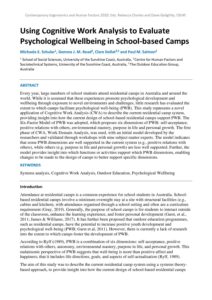| Document | Author Michaela E. Schuler, Gemma J. M. Read, Clare Dallat and Paul M. Salmon |
| Abstract Every year, large numbers of school students attend residential camps in Australia and around the world. While it is assumed that these experiences promote psychological development and wellbeing through exposure to novel environments and challenges, little research has evaluated the extent to which camps facilitate psychological well-being (PWB). This study represents a novel application of Cognitive Work Analysis (CWA) to describe the current residential camp system, providing insight into how the current design of school-based residential camps support PWB. The Six-Factor Model of PWB was adopted, which proposes six dimensions of PWB: self-acceptance, positive relations with others, environmental mastery, purpose in life and personal growth. The first phase of CWA, Work Domain Analysis, was used, with an initial model developed by the researchers and validated through workshops with nine subject matter experts. The model indicates that some PWB dimensions are well supported in the current system (e.g., positive relations with others), while others (e.g. purpose in life and personal growth) are less well supported. Further, the model provides insight into which functions or activities support which PWB dimensions, enabling changes to be made to the design of camps to better support specific dimensions. |

